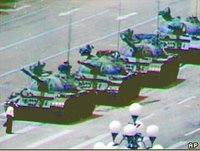 Seventeen years ago thousands of pro-democracy Chinese students occupied Tiananmen Square for several weeks while the Beijing public held off the military by blocking convoys unwilling to shoot those in their way. For those of us watching at the time, we thought we'd seen it all before: the fall of the
Seventeen years ago thousands of pro-democracy Chinese students occupied Tiananmen Square for several weeks while the Beijing public held off the military by blocking convoys unwilling to shoot those in their way. For those of us watching at the time, we thought we'd seen it all before: the fall of the  former Soviet regimes of Central Asia and Eastern Europe and the liberation of millions of human beings from their Communiust masters had begun in just such a way, and liberation had been effected in the main peacefully, and without bloodshed.
former Soviet regimes of Central Asia and Eastern Europe and the liberation of millions of human beings from their Communiust masters had begun in just such a way, and liberation had been effected in the main peacefully, and without bloodshed. Not in China.
On May 30, protestors in Tiananmen Square erected a papier-mâché ‘Goddess of Democracy’ which for a time faced down the iconic portrait of Chairman Mao hanging from the gates of The Forbidden City. It lasted just five days before the killing began.
- In London local Chinese and officials gathered in Trafalgar Square last weekend to remember the victims of the massacre. "There are tears that flow in China for the children that are gone," said the lyrics of a song played on a stereo. "Oh children, blood is on the square. Oh children, blood is on the square."
- In Hong Kong, thousands of protestors staged a candlelit rally to mark the pro-democracy rally that ended in the slaughter of 3,000 civilians.
- In the US, the State Department called for China to provide a full accounting of those who were killed, were detained, or went missing during the Tiananmen Square demonstrations 17 years ago, and of "the government's role in the massacre."
- That call is echoed in Taiwan by Taiwan's main opposition leader. "The mainland has to face the issue sooner or later," Ma Ying-jeou, chairman of the island's main opposition Nationalist Party, told Reuters late on Saturday when asked if he had any words for Chinese leaders on the eve of the Tiananmen anniversary. "The earlier it can face the issue and adjust, I think the more (chance) it can succeed."
LINKS: 17th Tiananmen aniversary passes in China - San Jose Mercury/AP
'Oh children, blood is on the Square' - Epoch Times
Thousands mark Tiananmen Square anniversary in Hong Kong - Fox News
US calls for accounting of Tiananmen Square deaths, detentions - US Department of State
Interview: Taiwan's Ma says China must reassess 1989 protest - Reuters, India
HRIC launches podcast interviews for June 4th anniversary - UN Observer
1989: Massacre in Tiananmen Square - BBC News: On this day
TAGS: History-Twentieth_Century, Socialism, Politics-World
6 comments:
(may I ask if we ever held commoration for Kent State?)
I'd like to offer couple more references in addition to PBS Frontline's "The Tank Man", where it reported the fact students were allowed to leave peacefully once the troops arrived, and Chinese government did investigate this, and release casualty figure of 240 some dead (incidentally in-line with our own NSA intel estimate.)
An article by Gregory Clark on pack journalism:
http://mparent7777.livejournal.com/7702519.html
"the so-called massacre was in fact a mini civil war as irate Beijing citizens sought to stop initially unarmed soldiers sent to remove students who had been demonstrating freely in the square for weeks. When the soldiers finally reached the square there was no massacre."
An article by Columbia Journal Review on passive journalism:
http://archives.cjr.org/year/98/5/tiananmen.asp
"as far as can be determined from the available evidence, no one died that night in Tiananmen Square.
...
Hundreds of people, most of them workers and passersby, did die that night, but in a different place and under different circumstances."
[Just for reference, throwing molotov cocktail at riot police is a crime in US.]
Wow. What kind of person leaps to the defence of a totalitarian regime by comparing one atrocity with another?
The difference between the events at KSU and Tiananmen Square, Nameless One, is that while both consisted of state authorities firing upon protesting citizens, the US govt does not - and cannot - ignore the event (as much as I suspect it would like to).
Unlike the old men in Beijing.
Since when do two wrongs make some kind of right?
"sus", while two wrongs don't make a right, it does give some perspective.
The Chinese government had not ignored this. PBS Frontline's "Tank Man" said Chinese government did investigate this, and release casualty figure of 240 some dead (incidentally in-line with our own NSA intel estimate.)
Thousands didn't die, and people weren't mowed down with machin guns like we used "people mower" in Iraq and Afghanistan either.
I don't think I've ever hosted an apologist for mass murder before.
For once, I'm almost lost for words.
The Chinese government is awfully good at holding itself accountable for murder and torture "Bobby". I guess the fact that people get arrested if they try to debate this, or even report on it in China means there is nothing to hide.
Authoritarian regimes aren't very good at being honest.
Bobby makes a good enough point for me, even if he stretches a long way too far. Why is everyone here so quick to criticise and question China, North Korea, Bolivia, those murdering old ruskies etc etc etc but so quiet on what has recently occurred in Serbia, Afghanistan and Iraq?
Post a Comment